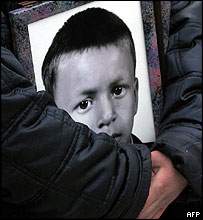|
By Chloe Arnold
BBC News, Beslan
|

At Beslan's School Number One, it is as though time has stood still since that terrible day last September when a hostage siege turned into a bloodbath that killed more than 330 people, half of them children.

For survivors of the Beslan massacre, the agony is not over
|
In the ruins of the school gymnasium, where the hostage-takers herded their captives and where most of the victims died, the walls are still scarred with bullet marks and charred rafters are left in what remains of the roof.
Time has stood still too for the women in Beslan who lost their children in the bloodshed.
The grief has not become any easier to bear and - for some just as hard to take - they still do not know how some 30 heavily-armed men were allowed to take a whole school hostage and how, three days later, they were allowed to gun their children down.
A few kilometres down the road in the regional capital, Vladikavkaz, a court has begun trying 24-year-old Nur-Pashi Kulayev, the only surviving hostage-taker and the sole suspect for the Beslan massacre.
Every day that the court is in session, at least some of Beslan's bereaved mothers, distinguishable by their black dress and headscarves, have been watching proceedings.
But far from giving the women a sense of "closure", the trial has reawakened anger that after all this time, only one man is in the dock.
"Kulayev is simply being used as a scapegoat," says Susanna Dudiyeva, the head of campaign and support group the Beslan Mothers' Committee, who lost her 13-year-old son, Zaurbek, in the siege.
Massacre memories
The Mothers' Committee say the Russian government should take some responsibility for what happened.

The trial of Nur-Pashi Kulayev has focused relatives' grief
|
For the fact that the hostage-takers somehow passed through police checkpoints to reach Beslan, and for letting rag-tag local security forces make a chaotic rescue attempt, possibly causing needless deaths, instead of sending in better-trained federal troops.
An official commission of inquiry has been looking into the circumstances of the siege. But the women suspect an official cover-up.
At one point in the trial, one of the bereaved mothers turned to Mr Kulayev, stooped behind metal bars on one side of the courtroom, and pleaded with him: "Just tell us what really happened."
Members of the Mothers' Committee say they have tried to move on, to put the events of last year behind them, if only for the sake of their surviving children.
But that is hard to do in a small town which, everywhere you turn, offers up reminders of those three days.
Children's graves
A little way from the school gymnasium, in the main building, the walls are still spattered with blood.
In the chemistry classroom, the floor is littered with rubble and broken glass.

The gymnasium in Beslan has changed little since the siege ended
|
Elsewhere, mourners have left bottles of water standing on the floor, an offering to the dead children who were given nothing to drink by their captors.
A short drive away at Beslan's cemetery, the graves, just like in any cemetery, are littered with flowers.
But many of them are children's graves. These are the ones with soft toys, pieces of chocolate and toy cars, perched on top.
Few people here have been able to afford proper gravestones so the graves look freshly dug: bare earth and wooden posts, some of them with photographs of a dead child stuck to them.
One plot has six people buried in it side by side; a whole family wiped out in the massacre.
'Meaningless suffering'
The Beslan Mothers Committee scored a victory of sorts this week when Alexander Dzasokhov, the head of the North Ossetia region that includes Beslan, resigned.

Relatives are finding it difficult to rebuild their lives after their loss
|
He said he was leaving to make way for a younger leader, but he had been heavily criticised for his handling of the hostage crisis.
But the women in the group say they cannot rest until they know the full truth of how their children died, and why.
"For many of us, what happened simply remains a mystery," said Aneta Gadiyeva, whose nine-year-old daughter, Alana, died in the siege.
"We don't know anything and we don't understand anything. We simply can't see the meaning of all that suffering."

